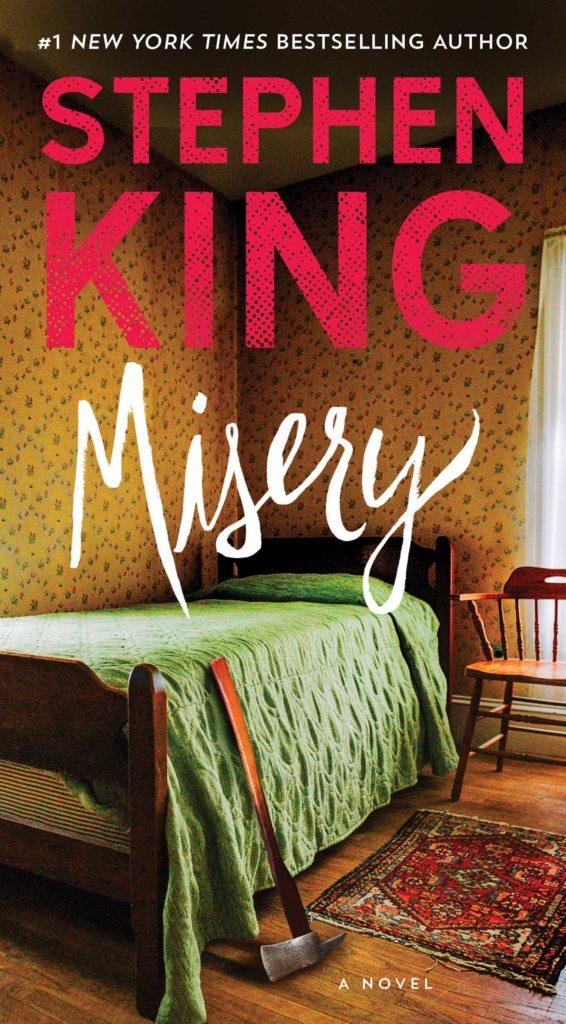This past June, on my solo 14-hour road trip to my summer job in Maine, I decided to take a quick detour at Stephen King’s mansion in Bangor. I did this less as a fangirl and more to aggravate my younger sister, Zoe, who is in fact a huge fangirl and has never been to Maine. So perhaps it was with a bit of remorse when I recently caved in to her incessant book recommendations and sat down with her favorite King novel, “Misery.”

“Misery” follows writer Paul Sheldon, author of the popular “Misery” book series, after he is in a brutal car accident in the middle of the Colorado winter. He wakes up in the house of former nurse Annie Wilkes, who proclaims herself to be Paul’s “number one fan.” Though he (barely) survives, Paul is bedridden and in intense pain, and unable to go to the hospital because of the dangerous roads.
When Annie reads in Paul’s final “Misery” installment that the main character dies, Annie and the novel as a whole take a dark turn. The seemingly quirky but caring Annie quickly reveals herself to be an anal, manic psychopath. She then forces Paul to write a new ending to the novel, one in which Misery survives and lives happily ever after. Thus, Paul is no longer in control of either his own life or the lives of his characters.
One of the most fascinating parts of the book is King’s characterization of Annie. In an altogether genius exposition, King describes Annie as having a “solid fibrous unchannelled body.” But not only is the description of her physical appearance hilarious, so too is her dialogue. Annie frequently uses kooky phrases like “dirty birdie” and “cockadoodie,” and she refers to Paul as “Mister Man.”
Most self-proclaimed King fans likely associate him with a scary imagination, jump cuts of creepy clowns and ominous twins in a blood-soaked hotel hallway. But King’s writing style truly brings his characters to life, transporting the reader into Paul Sheldon’s barren bedroom while he types away at his clackety old typewriter (with its missing letter “n”). King is not just good at giving readers goosebumps, he is also good (great, maybe) at all the things we attend to in English class – plot, characterization, language.
An additional compelling element to “Misery” is King’s introspection on the writing process itself. Because Annie forces Paul to rewrite his story, King toys with the question of whether authors are truly in control of the destiny of their characters. In fact, in “Misery,” Paul says that writing should be “masturbatory.” For both King and his character Paul, writing itself is an addiction. These meditations on the writing process enriched my own reading experience, especially as someone who constantly strives to write better.
King is not just good at giving readers goosebumps, he is also good (great, maybe) at all the things we attend to in English class – plot, characterization, language.
All of this would be compelling on its own but becomes even more so when one places it in the context of Stephen King’s own life and career. For over a decade, King struggled with a crippling addiction to alcohol and cocaine which – fortunately – culminated in a family intervention and his eventual sobriety. “Misery” was one of the first books King wrote after regaining his sobriety, making this narrative about the struggle with addiction, mental illness and recovery incredibly authentic. In an interview with Rolling Stone, King said “‘Misery’ is a novel about cocaine. Annie Wilkes is cocaine. She was my number-one fan.” Thus, like many great stories, “Misery” is both a tale well-told on a literal level, and also a terrifying metaphor for something beyond that.
In 1999, 12 years after “Misery” detailed the incredibly painful aftermath of character Paul Sheldon’s car crash, King himself was hospitalized after a similarly brutal car accident. There may be some irony in this, but to me it speaks to King’s impressive imagination. That King had not experienced a car accident until years after he wrote about one just proves that his lived experience is not the only thing he has to draw on as a writer.
“Misery” was one of the first books King wrote after regaining his sobriety, making this narrative about the struggle with addiction, mental illness and recovery incredibly authentic.
I honestly hate to even see book jackets with actors on them, let alone see the movie version first, lest my imagination becomes imprisoned by the impression. Thus, I hesitate to mention there is a movie adaptation of “Misery” because after discovering Kathy Bates played Annie, I couldn’t picture the character without seeing Bates’ cherubic face. Despite Bates’ iconic portrayal, I urge you to resist the temptation of only watching the movie, as the book provides even more life, suspense, and terror.
Though I selfishly hate to admit it, my sister was right. In fact, I am now reading my second King novel. So, as we Grinnellians begin to settle in for what will inevitably be a long winter, I encourage you to cuddle up in your dorm and dive into the brilliant psychological horror, “Misery.”

























































